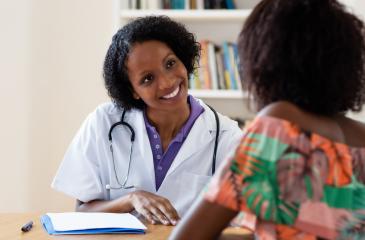Rahel Nardos, MD, director of global women’s health for the Center for Global Health and Social Responsibility, began to notice a trend when her patients from Somali, Latino, and Ethiopian communities came in to see her. They often brought their children to translate health concerns and help them navigate the health care system.
Nardos had an idea: What if we empowered these youth, who already serve as cultural brokers and health care navigators for their families, to be effective health advocates and bridges for their communities? What if we created opportunities for them to learn more about health care as a potential future career? What if we facilitated mentorship from health care providers of color who can inspire them and help them be better at what they are already doing?
“Sometimes it can feel overwhelming working in women’s health, you wonder if anything is moving the needle. I’ve been thinking about where we can go upstream, where we can really shift things for future generations,” said Nardos. “A lot of communities of color distrust health care professionals and health care systems due to historical discrimination and harm, miscommunication, and cultural differences. Young immigrants and refugees who are first generation in their families are trusted and often designated as cultural brokers for their families without much training. A lot of equity work begins with personal interactions. I see youth as a great asset and investment. They are the future of health care."
Nardos has been holding afternoon clinics at Community-University Health Care Center (CUHCC) in the Phillips neighborhood in South Minneapolis, where she trained for a summer as a medical student. CUHCC is a unique community health center that specializes in cross-cultural, whole-person care, and connects patients with social workers, mental health and legal services, interpreters, and much more, all in one place.
For this project, Nardos partners with SoLaHmo, a community-driven research program at CUHCC, made up of Somali, Latin American, Hmong, Karen, Vietnamese, Native American, Black/African American and LGBTQ/Two Spirit community members, researchers and health care providers. SoLaHmo members work together to make a difference in community health by tapping into community strengths and wisdom, while preparing community members and academicians to be equal partners in community-based participatory research.
Their aim is to hold space for conversations in Somali, Ethiopian, and Latin American communities to understand both the barriers to women’s health care and the role young people play. Exploring questions like, “what has been the experience of youth as cultural brokers when helping their families navigate women’s health care?”, “what are things that could be empowering to them?”, and “how can health care professionals leverage these relationships to bridge miscommunication and distrust?”
“I didn’t go to SoLaHmo with a set agenda, instead we generated ideas together so that everyone is involved in all aspects of the project,” said Nardos. “We are doing everything as a learning community, which is incredible; it's the first time I’ve done a project like this in a true community-based research partnership, looking at rules of engagement, how we will solve conflict and communicate with one another, which is something everyone should be doing.”
Both CUHCC and the Center for Global Health and Social Responsibility (CGHSR) embody the mission of advancing health equity. CUHCC serves as a premiere education site which leads in team-based care, and centers on person-family-community experience in order to transform care. CGHSR’s Global Women’s Health Initiative is committed to harnessing the collective wisdom of communities and academia to advance women’s health globally. The center engages with local and international partners to provide health education, leadership training and advocacy.
“This is global to local— understanding what barriers there are for women, listening deeply, engaging with the community to build trust and involving them in using their assets to come up with solutions. I listen to my patients, but I also need to listen to the collective voice and experiences for women in this community,” said Nardos. “It is my duty to listen—with the ultimate goal of improving health equity: this is how it starts.”
Creating a Pipeline for the Future of Health Care
Nardos and SoLaHmo are now engaged in the community-based participatory research partnership, Women’s Empowerment through Health Education for Adolescent Leaders (WE-HEAL). The project will be implemented in three phases: 1) Engage Somali, Latin American, and Ethiopian (SLE) communities through listening sessions with community leaders, adults who seek women’s health care, and youth. 2) Use the information gained through listening sessions to co-design and implement a program to reduce health care barriers by building Youth Health Ambassadors trained in leadership, advocacy, and health literacy. 3) Disseminate findings from both phase 1 and phase 2 of the project, and build community networks with collaborators who can scale-up the Youth Health Ambassador Program both locally and nationally.
WE-HEAL will bring the strengths and expertise of community research partners, community leaders, and SLE youth cultural brokers to the forefront of this project in order to understand the barriers that SLE communities perceive as obstacles to accessing women’s health care. The project will engage communities in identifying and elevating their own assets, particularly their youth, to address these barriers.
WE-HEAL is made possible by a generous contribution from the Lynne & Andrew Redleaf Foundation and other supporters.



